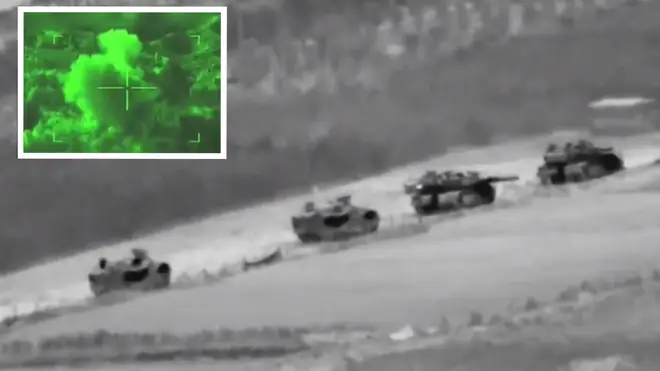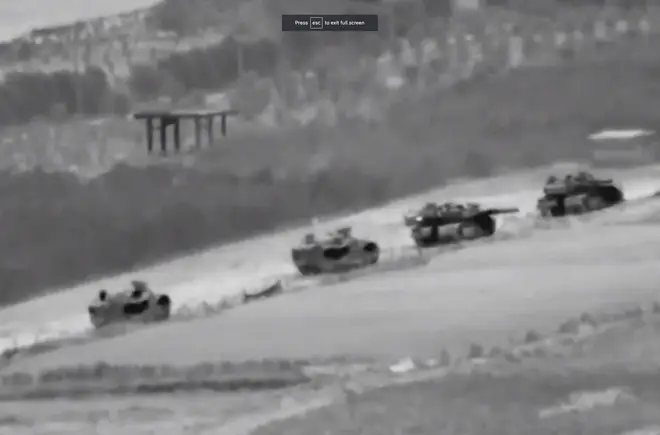
Nick Ferrari 7am - 10am
27 October 2023, 07:54

Israeli troops and tanks launched a second ground raid into northern Gaza last night, striking several Hamas targets in order to "prepare the battlefield" ahead of a widely expected ground invasion.
The latest raid came after the UN warned it is on the verge of running out of fuel in the Gaza Strip.
Tanks backed by fighter jets, helicopters ad drones crossed over the border, wiping out Hamas targets and infrastructure, the IDF said.
The raid took place near the Shuja’iyya neighborhood in the east of Gaza City as drones and combat helicopters swarmed overhead.
The Israeli military said: "During the last day, IDF ground forces, accompanied by IDF fighter jets and UAVs, conducted an additional targeted raid in the central Gaza Strip,".
OPERATIONAL UPDATE: The IDF conducted strikes on Hamas terrorist targets over the last 24 hours.
— Israel Defense Forces (@IDF) October 27, 2023
IDF ground troops, fighter jets and UAVs struck:
🔴 Anti-tank missile launch sites
🔴 Command & control centers
🔴 Hamas terrorist operatives
The troops exited the area and no… pic.twitter.com/yNdiY6XTby
"The IDF identified and struck numerous terror targets, including anti-tank missile launch sites, military command and control centres, as well as Hamas terrorists.”
Israeli Government spokesman Eylon Levy told LBC this morning: “"If we cease fire that is telling the terrorists of Hamas, they can get away with it.
"If we cease fire, it's telling the terrorists of Hamas who beheaded innocent people burned whole families alive, tortured, mutilated parents in front of their children, children in front of their parents. It leaves them free to do it again.

He added: "I'll tell you what's even worse. If we ceasefire it tells Hamas that the international community will restrain Israel and stop it from defending its people if they choose to do it again.
"And we can never go back to a world in which these brutal genocidal terrorists mere metres away from people's homes and Israel can invade well enter people's houses, abduct their children, take them into the Gaza Strip and massacre whole families that will never happen again."
Mr Levy said that "unlike previous rounds of violence and conflict with Hamas, this time the war will end with the total and utter defeat of Hamas. Never again, means not now not ever".
Rising death tolls in Gaza are unprecedented in the decades-long Israeli-Palestinian conflict.
Even greater loss of life could come if Israel launches an expected ground offensive aimed at crushing Hamas.
The Health Ministry in Hamas-ruled Gaza said that more than 750 people were killed over the past 24 hours, higher than the 704 killed the previous day.
By comparison, 2,251 Palestinians, mostly civilians, were killed in the entire six-week-long war in 2014, according to UN figures.

Andrew Marr speaks to senior surgeon in Gaza hospital
The Israeli military says it strikes only militant targets and accuses Hamas of operating among civilians in densely populated Gaza. Palestinian militants have fired rocket barrages into Israel since the war began.
During the overnight raid, the military said soldiers struck fighters, militant infrastructure and anti-tank missile launching positions. There were no immediate reports of casualties on either aide.
Meanwhile, an airstrike hit a residential building in the southern town of Khan Younis early Thursday.
Ambulances streamed into the nearby Nasser Hospital, but there was no official word on casualties. Family members said the building had housed 75 people, including 25 displaced relatives.
The Gaza Health Ministry says more than 6,500 Palestinians have been killed in the war. That figure includes the disputed toll from an explosion at a hospital last week.
The fighting has killed more than 1,400 people in Israel, mostly civilians slain during the initial Hamas attack, according to the Israeli government. Hamas also holds some 222 hostages in Gaza.
The warning by the UN agency for Palestinian refugees, UNRWA, over depleting fuel supplies raised alarm that the humanitarian crisis could quickly worsen.
Gaza's population has also been running out of food, water and medicine. About 1.4 million of Gaza's 2.3 million residents have fled their homes, with nearly half of them crowded into UN shelters. Hundreds of thousands remain in northern Gaza, despite Israel ordering them to evacuate to the south, saying those who remain might be considered "accomplices" of Hamas.
In recent days, Israel let more than 60 trucks with aid enter from Egypt, which aid workers say is insufficient and only a tiny fraction of what was being brought in before the war. Israel is still barring deliveries of fuel - needed to power generators - saying it believes Hamas will take it.
An official with the International Committee of the Red Cross said it hopes to bring in nearly a half dozen trucks filled with vital medical supplies.
"This is a small amount of what is required, a drop in the ocean if you will, given the severity of the consequences of the violence in the last two and a half weeks," said William Schomburg, head of the sub-delegation in Gaza.
"Today, we are looking at eight to 10 trucks coming in. We have more that are lined up," he said. "We are trying to establish a pipeline."
UNRWA has been sharing its own fuel supplies so that trucks can distribute aid, bakeries can feed people in shelters, water can be desalinated, and hospitals can keep incubators, life support machines and other vital equipment working.
If it continues doing all of that, fuel will run out by Thursday, so the agency is deciding how to ration its supply, UNRWA spokeswoman Tamara Alrifai told The Associated Press.
"Do we give for the incubators or the bakeries?" she said. "It is an excruciating decision."
More than half of Gaza's primary health care facilities and roughly a third of its hospitals have stopped functioning, the World Health Organisation said.
The conflict has also threatened to spread across the region. The Israeli military said Wednesday it struck military sites in Syria in response to rocket launches from the country. Syrian state media said eight soldiers were killed and seven wounded.
Strikes in Syria also hit the airports of Aleppo and Damascus, in an apparent attempt to prevent arms shipments from Iran to militant groups, including Lebanon's
Hezbollah. Israel has been exchanging near daily fire with Iranian-backed Hezbollah across the Lebanese border.
Lebanese state media said Israel conducted airstrikes and drone attacks early on Thursday in southern Lebanon, near the tense Israel-Lebanon border.
No casualties were reported but the strikes ignited fires in the fields near in the border town of Aita al Shaab, the National News Agency (NNA) reported.
On Wednesday night, Israeli strikes hit the Tyre district and a mattress factory there, NNA said, while small-arms fire was exchanged between militants and Israeli troops along the border.
Hamas's surprise rampage on October 7 in southern Israel stunned the country with its brutality, its unprecedented toll and the failure of intelligence agencies to know it was coming.
Prime Minister Benjamin Netanyahu said in a speech on Wednesday night that he will be held accountable, but only after Hamas was defeated.
"We will get to the bottom of what happened," he said. "This debacle will be investigated. Everyone will have to give answers, including me."
On Wednesday, the wife, son, daughter and grandson of Wael Dahdouh, a veteran Al-Jazeera correspondent in Gaza, were killed in an Israeli strike.
Mr Dahdouh and other mourners attended the funerals on Thursday wearing the blue flak jackets used by reporters in the Palestinian territories.